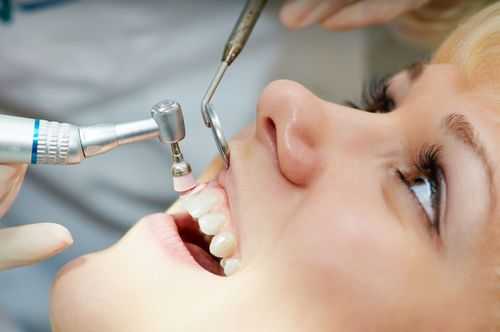Periodontitis is the common disease of the Germans
In Germany, every third adult suffers from mild periodontitis. Statistically, even one in seven adults has severe periodontitis, which can lead to severe health problems. In the end stage of periodontitis occasionally occurs in an untreated gingivitis tooth decay, which may have permanent consequences for the person affected.
Periodontitis and the screening for prevention
Precaution screening is a painless test that accurately represents the health of your teeth. This screening is also called PSI (Periodontal Screening Index) and can be done within a few minutes. Here, not only an advanced periodontitis can be detected, but also an early form of periodontal disease.
During the periodontitis check-up, your dentition is divided into a total of six different sections. The dentist subsequently examines each tooth with a specific probe to better assess it. The assessment of your teeth is made by values that are between four and zero.
With the label zero, you can assume that your gums are completely healthy. If you get the value one or two, you have gingivitis, which is inflammation of the gums that needs to be treated. Often it is already sufficient to use traditional treatments to quickly restore your gums. If your dentist judges your gum with a three or four, it means that you have extra deep and flat gum pockets. Especially then you need help as soon as possible, because the further the periodontitis progresses, the harder it is to get this under control.
The first symptoms of periodontitis
Periodontitis develops over a long period of time and is therefore often not recognized at the beginning. Unfortunately, it often happens that the periodontitis is noticed relatively late, which can have serious consequences for you. However, to be able to recognize a periodontal disease early, you should pay attention to typical symptoms.
 The first sign of periodontitis is the bleeding of the gums. The disease of the oral cavity is caused slowly by bacteria, which settle on the surface of your teeth and multiply there. In periodontal disease, there is almost always an inflammation of the gums, which is also referred to as gingivitis. This causes the gums to turn very red and begin to swell. Most sufferers recognize the disease from bleeding of the gums after the teeth have been brushed.
The first sign of periodontitis is the bleeding of the gums. The disease of the oral cavity is caused slowly by bacteria, which settle on the surface of your teeth and multiply there. In periodontal disease, there is almost always an inflammation of the gums, which is also referred to as gingivitis. This causes the gums to turn very red and begin to swell. Most sufferers recognize the disease from bleeding of the gums after the teeth have been brushed.
In addition, the bacteria in the mouth cause a foul-smelling bad breath, which also leads to a change in the taste in the mouth. When the pre-stage of periodontitis is reached, you can feel pain in the mouth that occurs in the affected areas. In addition, your teeth are especially sensitive to cold and heat. Even if there is no pain, periodontitis may be present. It is recommended to have regular check-ups at the dentist.
Periodontitis: Always go for a check-up
To avoid the risk of your potential periodontal disease spreading, you should take your dental check-up every two years. You do not have to pay yourself, because your health insurance company pays the costs for this check every two years.
The onset of periodontitis
Despite regular check-ups periodontitis can occur. To notice the onset of your gum disease, you should be aware of the changes in your gums. In periodontitis, your gums redden strongly and begin to regress. Mostly it comes as a result of the regression of the gums to exposed tooth necks. You can tell by your teeth working longer than before.
Occasionally it comes to the regression of your jawbone, which is produced by an inflammation. Some people also observe the emergence of pus or, in particularly severe cases, the formation of an abscess.
The late effects of periodontitis
In the context of periodontitis can occur dangerous late effects, which can cause you many problems in everyday life. In the worst case, your teeth may become loose in the mouth and even fail if you do not do anything about your periodontal disease. This is because the roots of your teeth no longer have any hold in your jaw, as it may suffer from bone loss due to the periodontal disease.
Periodontal disease is not only responsible for diseases in the mouth. It is suspected that the inflammation of the gums can also cause diseases of the vessels, which can cause a heart attack. This is because the pathogens of periodontitis can pass through the bloodstream to any part of your body where it can easily multiply.
Also, the cancer is to be promoted by the chronic inflammation of your gums. Likewise, the risk of developing diabetes, atherosclerosis or rheumatism increases. In pregnant women, it should be noted that the risk of premature birth increases when periodontal disease is present.

Prevent periodontal disease in a targeted manner
So that it does not even happen that you contract periodontal disease, you should note some tips. Start by brushing your teeth at least twice a day. However, wait at least 30 minutes after completing each meal before starting to clean. This will save your tooth enamel. Use interdental brushes or dental floss to clean the spaces between your teeth. If you are unsure whether to use the right brushing technique, ask your dentist.
Visit your dentist twice a year for a professional cleaning of your teeth. Note, however, that the cost of a dental cleaning is not borne by any health insurance. The check-up with your dentist should be done twice a year.
Did you know that smokers are up to six times more likely to develop periodontitis? Reduce your tobacco consumption and recognize the positive effects on your gums.
Related Posts
-

Periodontitis: symptoms, prophylaxis, treatment, dentolo
Periodontitis: To recognize and avoid > Your gums bleed while brushing your teeth? These are signs of gingivitis. If the disease remains untreated, it…
-

Implants: fixed teeth, center for dentistry
Implants: Fixed teeth make your everyday life easier A large number of people who opt for implants would like to immediately have a fixed dentition,…
-

Treating periodontitis with laser – bone augmentation, dental office dr
Treat periodontal disease with LASER bone formation We would like to inform you about periodontal disease, also called periodontal disease or…
-

Bleaching – Dentistry Center Hanover
Bleaching – whiten teeth in the Dental Spa Whitening is on everyone’s lips! Dental Spa uses the proven Zoom2 system from Discusdental for professional…

